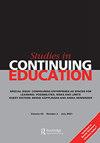成为一名警察。警察学生在现场训练期间的工作期望
IF 1.9
4区 教育学
Q2 EDUCATION & EDUCATIONAL RESEARCH
引用次数: 3
摘要
对工作场所学习的研究主要是从学习者的角度出发,对警察的研究也是如此。相反,本文的重点是具有现场训练官员(FTO)角色的警察,他们负责介绍、教学和指导参加高等教育计划的警察学生。目的是描述警务处对学生作为学习者的期望,并讨论这些期望如何影响未来警务人员的专业发展。通过对fto访谈的分析,我们展示了警察社会化是如何通过工作场所的情境学习而沉淀和延续的。研究结果表明,对于学生的内部参与和巡逻参与,FTOs的期望可以表现为相反的特征。在内部,fto希望学生的参与是被动的、适应的和服从的,而“巡逻”的fto希望学生发挥高度积极的作用。本文讨论了学习的社会维度如何影响警察学生参与和进入警察职业,特别是发展他们作为未来警察的职业认同,从而为警察实践做出贡献,并进一步发展。本文章由计算机程序翻译,如有差异,请以英文原文为准。
Becoming a member of the police. Workplace expectations of police students during in-field training
ABSTRACT Research into workplace learning explores mostly the learner’s perspective, which is also the case within police research. This paper focuses, instead, on police officers who have the role of field-training officers (FTO) and responsibility for presenting, teaching and guiding police students attending the higher education programme. The aim is to characterise the FTOs’ expectations of the students as learners, and discuss how these expectations shape the professional development of the future police officers. Through analysis of interviews with the FTOs, we show how police socialisation is sedimented and perpetuated through situated learning in the workplace. The findings show that the FTOs’ expectations can be characterised as opposites concerning students’ participation in-house and participation on-patrol. In-house, the FTOs expected the students’ participation to be passive, adaptive and obedient, while ‘on-patrol’ the FTOs expected that the students took a highly active role. The paper discusses how the social dimension of learning affects the police students’ participation and progression into the police profession, and, in particular, the development their professional identity as future police officers who can contribute to, and further develop, police practice.
求助全文
通过发布文献求助,成功后即可免费获取论文全文。
去求助
来源期刊

Studies in Continuing Education
EDUCATION & EDUCATIONAL RESEARCH-
CiteScore
4.70
自引率
6.70%
发文量
22
期刊介绍:
Studies in Continuing Education is a scholarly journal concerned with all aspects of continuing, professional and lifelong learning. It aims to be of special interest to those involved in: •continuing professional education •adults learning •staff development •training and development •human resource development
 求助内容:
求助内容: 应助结果提醒方式:
应助结果提醒方式:


